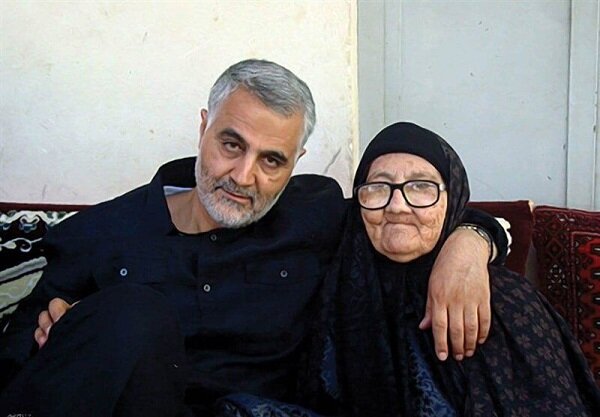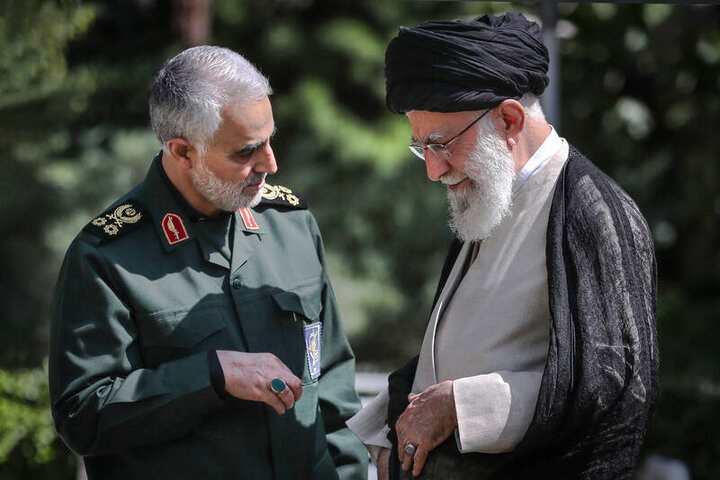
 QR Code
QR Code

In Memory of Gen. Soleimani : Iconic Anti-Terrorism Commander
3 Jan 2025 11:53
Islam Times - As Iran’s top anti-terror commander, martyr Lieutenant General Qassem Soleimani spared no effort to root out terrorism in the West Asian region.
Soleimani and Abu Mahdi al-Muhandis, the second-in-command of Iraq’s Popular Mobilization Units (PMU), and their companions were assassinated in a US drone strike authorized by then-US President Donald Trump near Baghdad International Airport on January 3, 2020.
Both commanders were highly revered across the Middle East because of their key role in fighting the ISIL Takfiri terrorist group in the region, particularly in Iraq and Syria.
Iran has declared January 3, the day Lieutenant General Qassem Soleimani was assassinated in a United States airstrike in Baghdad, as the International Day of Resistance.
Today coincides with the fifth anniversary of the assassination of Haj Qassem, the commander of the Quds force of the Islamic Revolution Guard Corps.
A terrorist attack on a person spearheading the fight against international terrorism was a clear example of adopting double standards by counter-terrorism plaintiffs.

Born on March 11, 1957, in the southeastern province of Kerman, Qassem grew up in a family involved in farming.
He started his religious and political activities at a young age and joined the Islamic Revolution Guard Corps (IRGC) after the victory of the Islamic Revolution in 1979.
Both in his personal life and on the battlefield, he was always humble and modest in his appearance, clothes, manner, and behavior. Contrary to his position, the amenities he had in life were similar to those of an ordinary person.
In many ceremonies, such as at the funerals of martyrs and their comrades, when meeting with the families and children of the martyrs, when giving speeches, or in public meetings, he would appear without any formality and would avoid becoming the center of attention.
To undermine security in West Asia, the multi-faceted project to create terrorist and takfiri groups, such as Al-Qaida and ISIL, was carried out to re-engineer the region.
To ensure West Asian security and counteract Western plots, Soleimani developed the Resistance Front and boosted the fight against extremism and terrorism based on developing the Resistance strategy.
Hajj Qassem pre-empted the Westerners’ plans with the aim of creating discord in the anti-Zionist camp.
Former president Ebrahim Raisi who was martyred in a helicopter crash in May 2024 once said that Soleimani symbolizes the fight against terrorism in the 21st century.
During the Iran-Iraq War, Soleimani was recognized as one of the field commanders and participated in various operations.
With his new strategies and strong leadership, he played an important role in Iran's victories, one of the hallmarks of Haj Qassem Soleimani was his courage and sacrifice on the battlefields and in the face of threats.
He was always on the front line and sacrificed his life in defense of the homeland and Islamic values.

Soleimani was known as a smart and resourceful military commander, he was able to achieve significant success on the battlefields by carefully analyzing the situation and using new strategies, Haj Qassem Soleimani was known for his love and humanity, he always helped the needy and the injured and tried to help improve the social and economic situation of the people.
Soleimani was known as a symbol of resistance to oppression and arrogance, he continued to fight oppression and corruption by emphasizing Islamic and human principles, Qassem Soleimani played a key role in the fight against terrorist groups such as ISIS, he helped defeat these groups by creating regional coalitions and working with local forces.
Soleimani is known as one of the founders of the Resistance Axis in the region, he helped strengthen the Axis by supporting resistance groups such as Hezbollah in Lebanon and the Iraqi Popular Mobilization.
As a successful military diplomat, he was able to communicate with different countries in the region and strengthen military and security cooperation.
Also, he helped build new coalitions and strengthen international relations by traveling to different countries.
The personality of Soleimani and his activities had a great influence on global politics.
He was known as a popular figure among Muslim and freedom-loving nations and was a symbol of resistance to global arrogance.

In 2013, after conquering Ramadi, Fallujah, Mosul, Tikrit, and some other areas in northern Iraq, ISIL entered into a full-scale war with the Iraqi government and managed to capture more than 50,000 kilometers of Iraq and subjugate more than 4 million of the country’s population.
While the ISIL was advancing in Iraq, the US took advantage of the difficult situation in the Arab country and pressured the then-Iraqi government to resign.
As a result, Prime Minister Nouri al-Maliki had no other choice but to resign.
ISIL's threats and brutality, the captivity of women and children, and the mass killing of opponents, as well as its strict laws not only painted an ugly, hateful, and completely false image of Islam but also instilled fear in the hearts of the Iraqi people and drove some opposition groups to the Iraqi government.
The Iraqi government asked General Soleimani for help to save it from this predicament, and following his military advice and managerial capability and initiative in mobilizing the people and using Hashd al-Shaabi, the offensive path of ISIL in Iraq was stopped.
General Soleimani’s skill in using the capacity of popular mobilization in cases such as bringing together Kurdish and Shia forces to fight ISIL was pivotal, and his supervision of the joint operations carried out by these two groups was fruitful.
In addition to monitoring the situation, General Soleimani’s active participation in popular operations was his other important feature that uplifted the spirit of the Iraqi popular mobilization against ISIL.
Emphasizing the principles of independence and freedom, Soleimani continued to fight against the colonial schemes and domination of Western countries and was known as an inspirational leader for oppressed nations.

In the years after his death, Soleimani’s image has been immortalized in media, literature, and public discourse.
His supporters celebrate him as a martyr whose sacrifices resonate with those fighting against oppression.
Commemorative events and memorials serve as rallying points for like-minded groups adhering to his vision of resistance.
Soleimani’s influence also permeates ideology, intertwining with anti-imperialist rhetoric and inspiring a new generation of activists and military leaders.
The Resistance Axis he advocated remains a significant force in the geopolitical landscape, with allied groups pushing for autonomy and self-determination against external pressures.
As the region continues to face governance issues, and foreign intervention, Qassem Soleimani’s memory endures as a symbol of resilience.
His life’s work highlights the complexities of combating terrorism and the multifaceted nature of resistance.
Story Code: 1182152